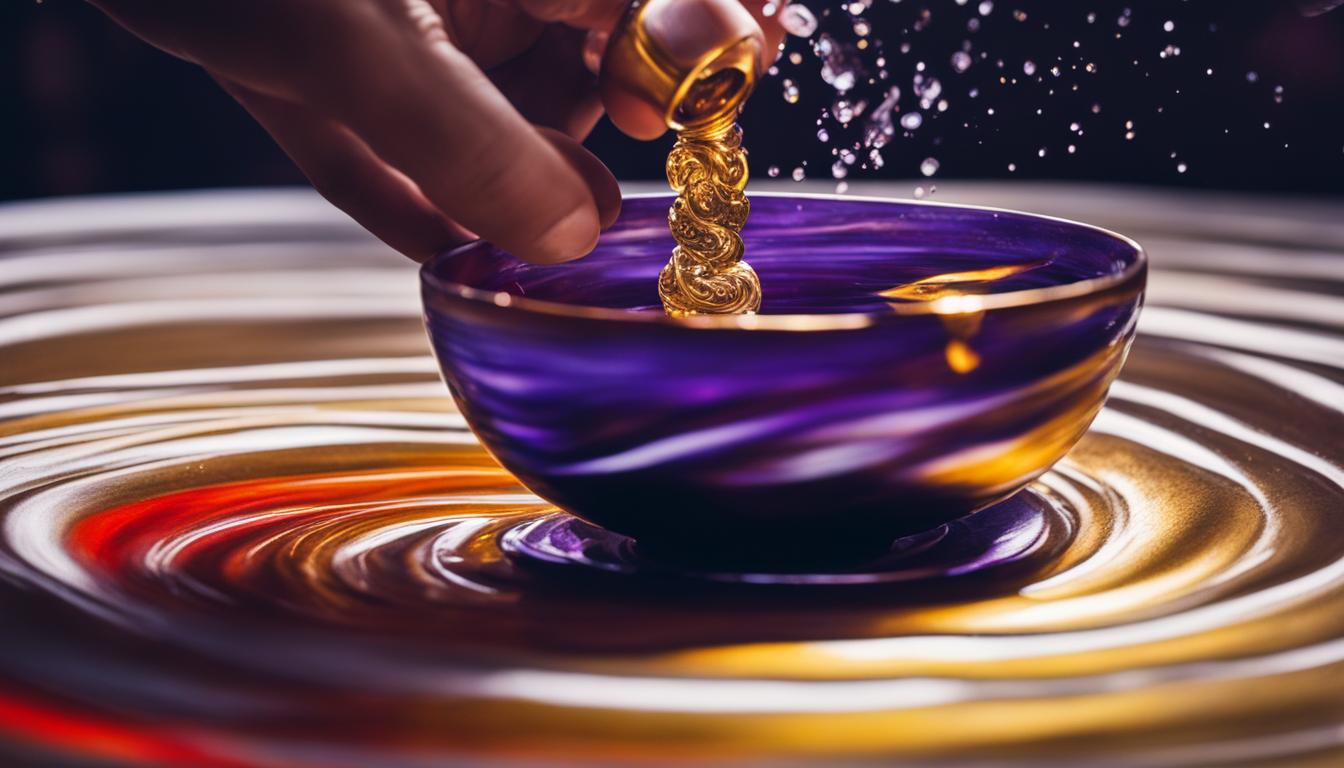Originally posted on November 16, 2023 @ 5:46 am
Have you ever wondered whether pouring your own sake brings bad luck? This is a prevalent belief in Japanese culture, where sake is not just an alcoholic beverage but holds symbolic value in ceremonial occasions and social interactions. In this article, we will delve deeper into the superstitions and customs associated with sake pouring and uncover whether there is any truth to the notion of bad luck.
Key Takeaways
- Japanese culture places significant value on the act of sake pouring in ceremonial occasions and social interactions
- Superstitions surrounding sake pouring, including the belief in bad luck, have become ingrained in Japanese society
- Understanding the history and cultural context of sake pouring is crucial for gaining a comprehensive understanding of its significance
- Cultural practices surrounding sake pouring continue to evolve over time, influencing traditional customs and altering perceptions
- Regardless of personal beliefs or superstitions, it is important to honor and appreciate cultural traditions surrounding sake pouring
Understanding Sake Pouring in Japanese Culture
Before we dive into the myth of bad luck associated with pouring your own sake, let us first explore the cultural significance of sake pouring in Japan. Sake is an important beverage in Japanese culture, carrying symbolic value beyond just its taste and alcohol content.
In Japan, sake is often served during traditional ceremonies, such as weddings, funerals, and Shinto rituals, as well as during social gatherings with friends or business associates. The act of pouring sake is not just about providing a drink for oneself or others, but is a gesture of respect and hospitality.
It is customary to pour sake for others before pouring for oneself, showing gratitude and care for those around you. Additionally, in formal settings, such as ceremonies, there are specific practices for pouring sake, such as using two hands and avoiding the crossing of arms to demonstrate proper etiquette.
Sake pouring is also connected to the concept of “wa,” which means harmony or unity. The pouring of sake represents the coming together of individuals in a shared moment, emphasizing the importance of community and social connections in Japanese society.
While these beliefs and customs surrounding sake pouring may vary among individuals and regions, they all highlight the significance of sake in Japanese culture and the importance of respect and unity in social interactions.
The Art of Sake Pouring
There are different styles of sake pouring in Japanese culture, depending on the occasion and setting. In formal events, such as traditional ceremonies, the “yamamai” style of pouring is often used. This involves tilting the sake bottle at a 45-degree angle and pouring it steadily into a cup held with both hands.
For more casual gatherings, the “tsunagu” style may be used, which involves pouring sake from one cup into another, creating a connection or bond between the individuals sharing the sake.
Regardless of the style used, the act of sake pouring in Japan is seen as an art form, with specific techniques and practices passed down through generations.
“Sake is an important beverage in Japanese culture, carrying symbolic value beyond just its taste and alcohol content.”
Now that we have a better understanding of the cultural significance behind sake pouring, let us explore the superstitions and beliefs associated with pouring your own sake in the next section.
Superstitions and Folklore Surrounding Sake Pouring

Sake pouring is surrounded by a wealth of superstitions and folklore in Japanese culture. This has led to some interesting beliefs regarding pouring your own sake.
“Pouring your own drink invites bad luck.”
This is perhaps the most well-known superstition associated with sake pouring. The idea is that pouring your own drink is like pouring one for the dead, which is considered bad luck in Japanese culture. The result of going against this belief is said to be a shortened life span.
Another lesser-known belief is that empty cups are bad luck. According to this superstition, pouring sake into an empty cup is a bad omen, as it signifies that the cup’s owner will not live to see it filled again.
There are also beliefs about the order in which you pour sake. For example, it is said that the sake should be poured in a particular order depending on the age and status of the drinkers. If a person of lower status pours sake for someone of higher status before pouring for themselves, it is believed that they will suffer misfortune as a result.
One more belief is that pouring sake from a cracked or chipped vessel is unfortunate. This belief is thought to have originated from Zen Buddhism, as the act of pouring from a damaged vessel symbolizes a lack of mindfulness and care.
These superstitions may seem strange and outdated to those outside of Japanese culture. However, they play a significant role in the traditions and customs surrounding sake pouring.
Table 1: Common superstitious beliefs about pouring your own sake in Japanese culture
| Superstition | Meaning |
|---|---|
| “Pouring your own drink invites bad luck” | Pouring your own sake is like pouring one for the dead and brings misfortune. |
| Empty Cups are bad luck | Empty cups signify a shortened lifespan for the cup’s owner. |
| Pouring Order | Sake should be poured in a particular order depending on age and status. Pouring for someone of higher status before oneself brings misfortune. |
| Cracked or Chipped Vessels | Pouring sake from a damaged vessel is unfortunate and symbolizes a lack of mindfulness and care. |
Table 1 showcases the most common superstitions associated with pouring your own sake in Japanese culture. While these practices may seem strange to outsiders, they hold deep cultural significance and foster a sense of respect and tradition.
The Influence of Iwai-zake on Sake Pouring Customs
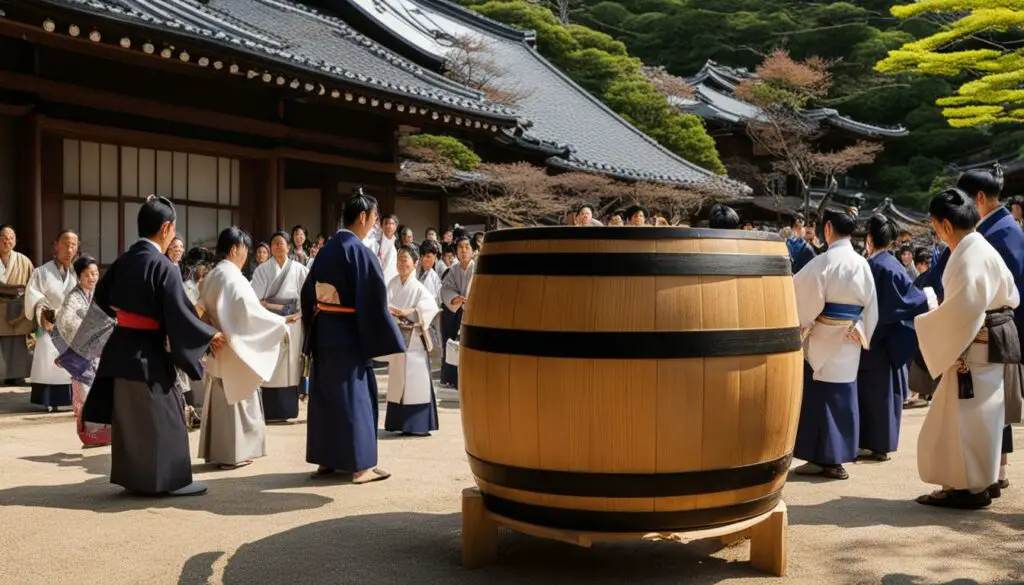
Sake pouring customs play a significant role in Japanese culture, and one of the most essential traditions is Iwai-zake. In this practice, sake is poured to celebrate a special occasion or mark an important event. It holds cultural and symbolic value, and its influence extends to the belief of bad luck associated with pouring your own sake.
Iwai-zake is an integral part of Japanese culture and is observed in various ceremonies and festivities. It is customary for people to pour sake into a masu, a wooden square-shaped box, or a sakazuki, a small sake cup, during weddings, birthdays, and other significant events.
The act of pouring Iwai-zake is believed to bring good fortune and symbolizes the appreciation of the occasion and the people involved. It is also seen as a form of respect for those celebrating the event and signifies support and goodwill.
Iwai-zake’s influence extends to the belief that pouring your own sake during ceremonial occasions can bring bad luck. It is customary for a third party to pour sake for someone else during such events, and pouring your own sake is often considered disrespectful.
However, in casual settings, such as bars and restaurants, it is perfectly acceptable to pour your own sake, and many Japanese people do so without any superstitions or beliefs attached.
| Iwai-zake | Sake Pouring Customs | Luck and Sake Pouring |
|---|---|---|
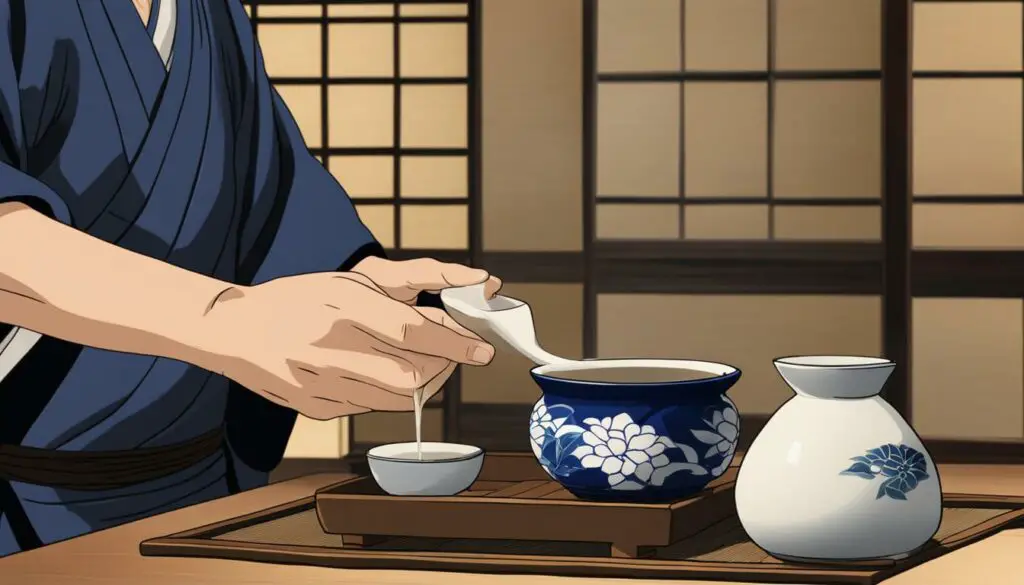 |
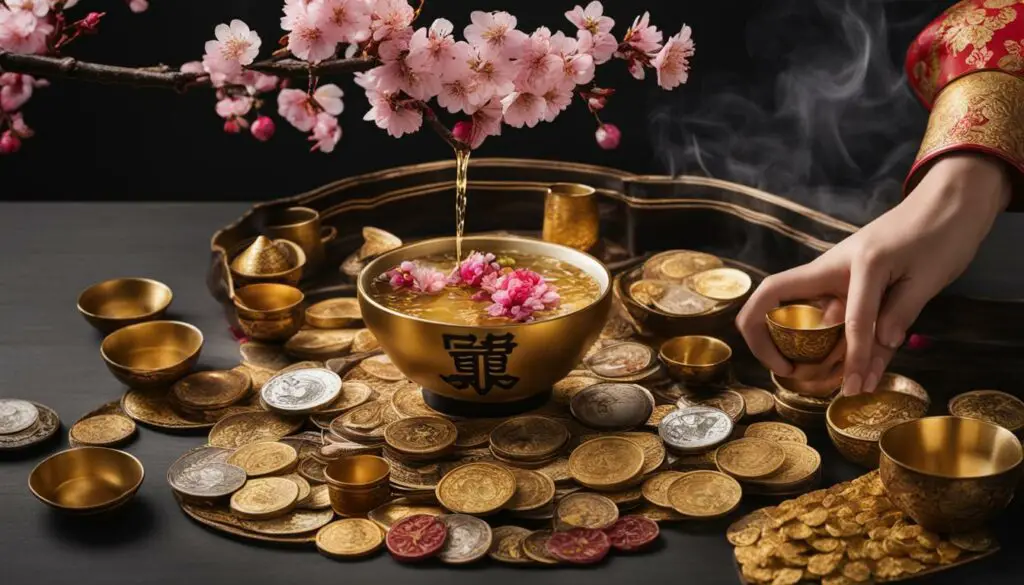 |
It is important to note that while the belief in bad luck surrounding pouring your own sake is prevalent, it is not a universal belief in Japan. The tradition of Iwai-zake holds significant cultural and symbolic value, but it is up to personal choice whether to observe it and attach any beliefs to it.
Ultimately, the influence of Iwai-zake highlights the cultural significance of sake pouring customs and the traditions associated with it. It is a form of respect, appreciation, and celebration in Japanese culture, and its customs should be understood and appreciated by those who participate in them.
Breaking the Myth of Bad Luck
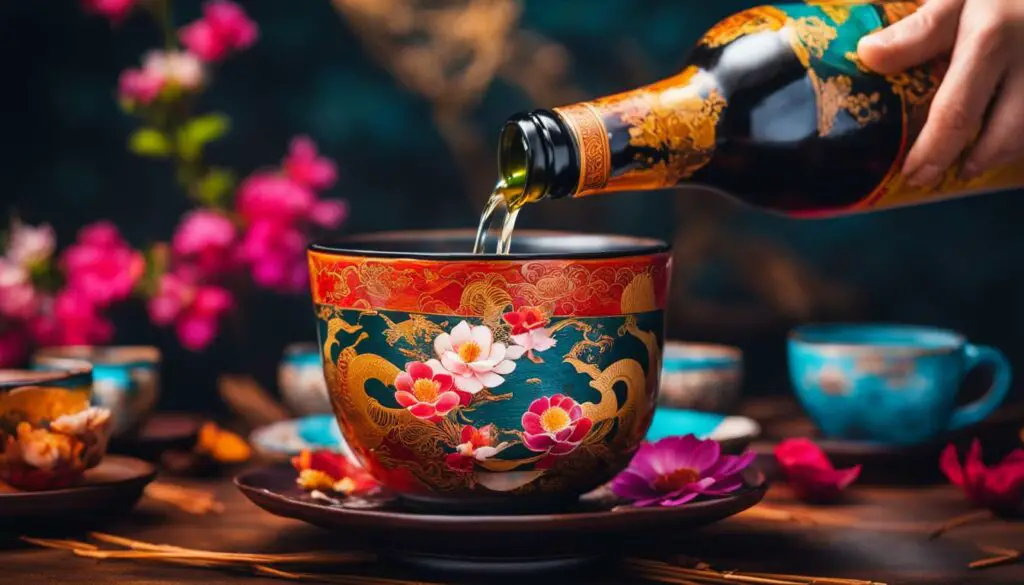
Many beliefs surround the act of pouring your own sake, and the most prevalent of them is the fear of bad luck. Some people believe that pouring your own sake results in misfortune or even death. However, cultural experts argue that this belief is a myth and has no basis in reality.
One of the reasons behind the myth of bad luck is the idea that pouring your own sake shows disrespect towards your guests. This notion is rooted in the Japanese cultural tradition of hospitality, which emphasizes the importance of serving others before serving yourself. However, this custom does not apply when pouring sake for oneself, especially in a casual setting.
Another reason for the myth of bad luck is the association of sake with Shinto rituals, where the drink is offered to deities. Pouring sake for oneself during these ceremonies is seen as disrespectful, but this notion does not apply to everyday situations.
Furthermore, pouring your own sake is a personal choice. Sake pouring is an art that requires skill and attention to detail, and many people take pride in their ability to pour a perfect glass of sake. Denying oneself the pleasure of pouring their own sake due to a superstition would be unfair and unnecessary.
Overall, the idea of bad luck associated with pouring your own sake is a myth, and individuals should feel free to pour sake for themselves or their guests, depending on the situation. It is essential to respect cultural traditions but not at the expense of personal choice and preference.
Cultural Significance and Personal Choice
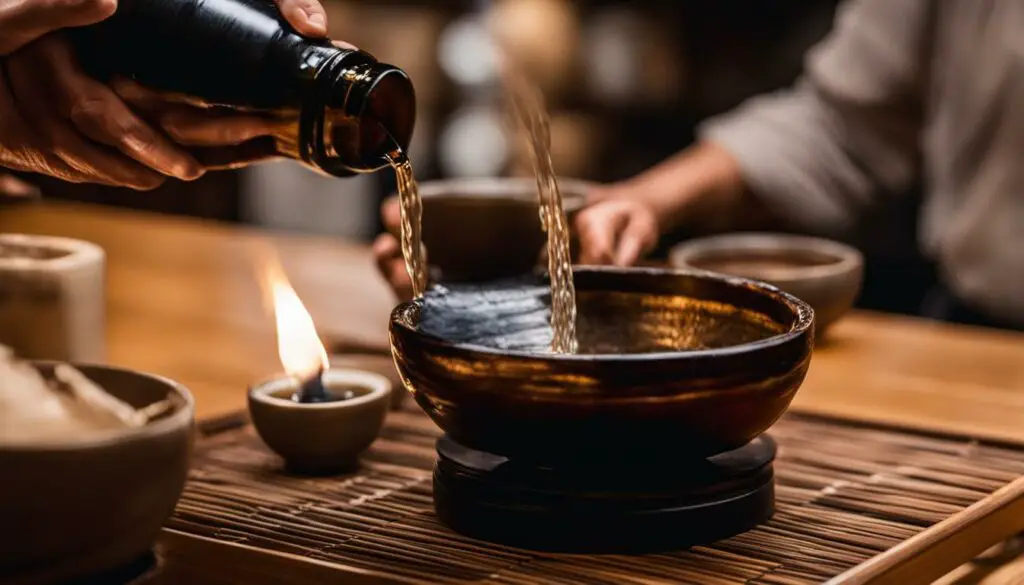
In Japanese culture, pouring sake is not just a customary practice but also holds a symbolic meaning. The act of pouring sake is often seen as a gesture of respect, hospitality, and gratitude towards others. It is a way to express appreciation and build relationships with those around you.
While there are beliefs and superstitions associated with pouring your own sake, it is also essential to recognize that personal choice plays a significant role in this practice. Some people may prefer to pour their own sake as a way to assert their independence and demonstrate their self-sufficiency.
It is also worth noting that cultural practices and beliefs can vary depending on the region, occasion, and individual preferences. In some situations, it may be customary for guests to pour sake for each other, while in other instances, it may be expected for the host or hostess to pour sake for everyone present.
Ultimately, the act of pouring sake is a personal choice that reflects cultural practices, individual preferences, and social norms. It is essential to respect these customs and beliefs, whether you choose to pour your own sake or not.
“In Japan, there is a saying that goes, ‘The guest is god.’ This means that hospitality is a fundamental cultural value, and we treat our guests with utmost respect and care.”
The Influence of Gender Roles on Sake Pouring
Gender roles can also play a significant role in sake pouring customs. Traditionally, it was considered inappropriate for women to pour sake for men, and vice versa, in formal settings. However, this practice has evolved over time, and it is now more common for both men and women to pour sake for each other in casual or social settings.
Despite these changes, some older generations may still adhere to traditional beliefs about gender roles and sake pouring. It is important to be mindful of these cultural nuances and respect the preferences of those around you.
Differences in Sake Pouring Etiquette
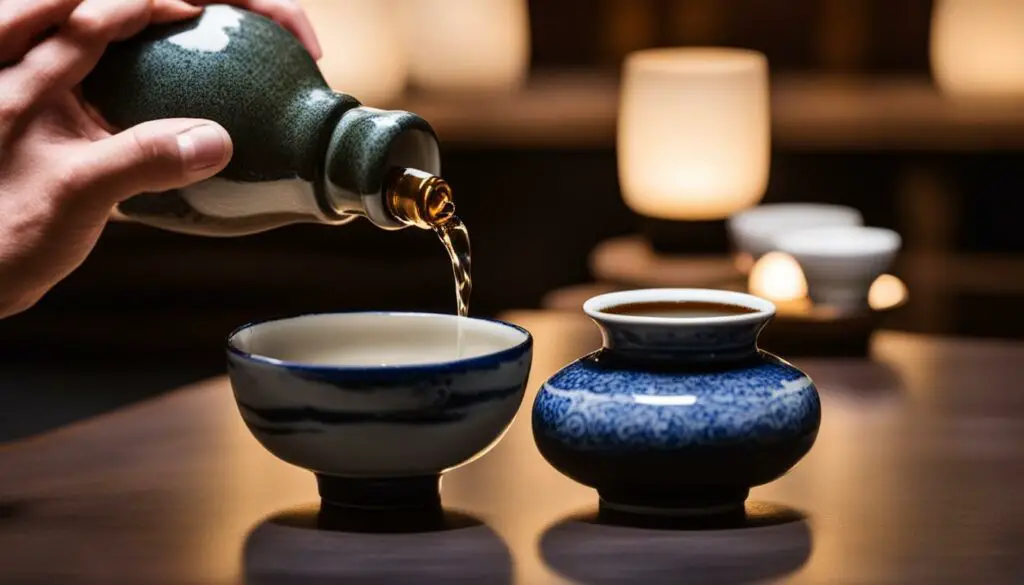
When it comes to pouring sake, the etiquette can vary depending on the context and occasion. Social status and gender can also play a role in the way one should pour sake. Understanding the correct way to pour sake is essential to avoid making a social faux pas. In formal settings, such as traditional ceremonies, a more structured and formal approach is necessary.
| Settings | Pouring Etiquette |
|---|---|
| Formal settings | The host should pour sake for the guests. The cup should be held with both hands, and it is customary for the guest to hold the cup with both hands as well while receiving the sake. |
| Casual gatherings | It is acceptable for individuals to pour sake for themselves. When pouring for others, pouring with the right hand while placing the left hand on the bottom of the bottle is considered polite. |
It is also essential to note that pouring your own sake is not considered rude in modern times, especially in less formal settings. However, the gesture of pouring for others holds significant social value and is an important aspect of sake pouring customs.
“In Japanese culture, pouring sake is not just about serving a drink to someone. It is a symbolic and significant act that represents hospitality and respect.”
Understanding the varying rules and customs of sake pouring is a crucial aspect of respecting Japanese culture. Whether it’s a formal ceremony or a casual gathering, the act of pouring sake holds immense importance and should be approached with care and consideration.
Exploring Other Beliefs and Superstitions
While the notion of bad luck associated with pouring your own sake is the most commonly known belief, other superstitions exist in Japanese culture concerning this act. Let’s take a look at some other intriguing beliefs and customs:
- Awareness of Other’s needs: In Japan, it is customary that before pouring your own sake, you should first fill the cups of others at the table. This gesture signifies respect towards others and their needs before our own. This concept of putting others first is a cornerstone of Japanese culture.
- Don’t go back: Once you have started pouring sake, it is considered bad luck to stop halfway and go back. It is believed that going back signifies a lack of commitment and consistency in one’s actions. Therefore, it is essential to pour decisively the first time, without hesitation or doubt.
- Never refill your own cup: It is also customary not to refill one’s own sake cup. Instead, one should wait for someone else to refill it for them. This practice again signifies respect towards others and the establishment of social bonds. It also promotes a sense of community and togetherness.
These customs and beliefs beyond the idea of pouring your own sake signify the importance of respect, social harmony, and gratitude in Japanese culture. They serve as reminders that our actions towards others and the world around us have consequences and should be approached with thoughtfulness and intentionality.
Historical Perspectives on Sake Pouring
The belief in the bad luck associated with pouring your own sake has its roots in Japanese historical traditions and cultural practices. In pre-modern Japan, sake was a valuable commodity that symbolized the strength and vitality of a community. As such, the act of pouring sake was linked to social hierarchies, and it was the duty of the most respected member of the group to pour sake for others. In this sense, pouring one’s own sake was seen as a sign of disrespect and an act of taking away from the community, leading to the belief that it would bring bad luck.
While this belief has evolved over time, the historical context sheds light on its origins and why it has persisted in Japanese culture. The belief in bad luck associated with pouring one’s own sake is not just an isolated case; it is part of a broader belief in the interconnectedness of people and their place in the community. By pouring your own sake, you break the social norms and betray the respect and responsibility that comes with being a member of the group.
This belief is also linked to the symbolism of sake pouring in Japanese culture. Sake was traditionally used in Shinto rituals, where it was offered to deities and spirits as a symbol of gratitude and respect. Pouring one’s own sake was seen as a violation of this sacred act, leading to the belief that it would invite misfortune and disrespect the deities.
As Japan modernized and became more Westernized, the belief in bad luck associated with pouring one’s own sake gradually lost its significance. However, it is still a prevalent belief in Japanese society, particularly in traditional settings and formal occasions, where etiquette and respect for cultural practices are highly valued.
“The belief in bad luck associated with pouring one’s own sake is part of a broader belief in the interconnectedness of people and their place in the community.”
Evolving Perspectives and Modern Practices
As society progresses, cultural practices inevitably evolve. The same can be said for the beliefs and superstitions surrounding pouring your own sake.
While the act of pouring one’s own sake was once seen as taboo, modern perspectives have shifted. Younger generations are embracing the individualistic approach and breaking away from traditional customs.
Moreover, with the globalization of Japanese culture, pouring your own sake has become a common practice outside of Japan. As more people appreciate the art of sake and engage in cultural exchanges, the superstition of bad luck associated with pouring one’s own sake is losing its grip.
It is important to note that some traditionalists still adhere to the belief of bad luck and view pouring one’s own sake as disrespectful. However, for many individuals, pouring their own sake is a personal choice and does not carry any negative connotations.
As with any cultural practice, it is essential to approach it with respect and appreciation for its significance. Pouring your own sake can be a meaningful and enjoyable experience that allows for greater immersion in Japanese culture.
Cultural Appreciation and Respect
As we explored throughout this article, sake pouring customs hold a deep cultural significance in Japanese culture. They are rituals that showcase respect, gratitude, and hospitality, deeply ingrained in Japanese social interactions.
Whether it is the tradition of Iwai-zake or the superstitions surrounding pouring your own sake, these customs provide a glimpse into the rich cultural heritage of Japan.
It is essential to approach these customs with a deep appreciation and respect, irrespective of personal beliefs or superstitions. By acknowledging and honoring these traditions, we demonstrate a willingness to understand and embrace diverse cultural practices.
As we continue to navigate a globalized world, cultural sensitivity and appreciation are more crucial than ever. Let us celebrate the diversity of global cultures and work towards a more inclusive and harmonious future.
Conclusion
After a thorough exploration of the belief surrounding pouring your own sake, we hope to have provided insights that dispel the myth of bad luck. Sake pouring is a significant aspect of Japanese culture, encompassing social customs, historical traditions, and personal choice.
As we have seen, the act of pouring one’s own sake is not necessarily associated with bad luck. Instead, it holds a deeper meaning, symbolizing respect and appreciation for cultural practices and traditions.
While cultural beliefs and superstitions evolve over time, it is crucial to appreciate and respect their significance. Whether you choose to pour your own sake or prefer to observe traditional customs, cultural appreciation and respect should remain at the forefront.
In conclusion, the question of “Is it bad luck to pour your own sake?” is a fascinating topic that provides insights into Japanese culture and traditions. We hope that this article has shed light on the beliefs and superstitions surrounding sake pouring and instilled a greater understanding and appreciation for this revered beverage.
FAQ
Is pouring your own sake considered bad luck in Japanese culture?
The belief that pouring your own sake is bad luck is a popular superstition in Japanese culture. However, it is important to note that this belief is not universally held and may vary among individuals and different social contexts.
What is the significance of sake pouring in Japanese culture?
Sake pouring holds symbolic value in Japanese culture, representing ceremonial occasions and social interactions. It is not only about the act of pouring sake but also about the underlying cultural traditions and customs associated with it.
What are some superstitions and folklore surrounding sake pouring?
Over time, various superstitions have emerged regarding pouring your own sake. These beliefs range from tales of misfortune to customs rooted in cultural practices. Exploring these superstitions adds depth to the understanding of sake pouring traditions.
How does Iwai-zake influence sake pouring customs?
Iwai-zake, the tradition of pouring sake to celebrate special occasions or mark important events, has a significant impact on sake pouring customs. It can affect how pouring one’s own sake is perceived and may contribute to certain superstitions surrounding the act.
Do beliefs about bad luck when pouring your own sake have any basis?
The belief in bad luck associated with pouring your own sake is primarily rooted in cultural superstitions. While some may hold steadfast to these beliefs, it is essential to consider different perspectives and question the validity of such superstitions in modern society.
What role does personal choice play in sake pouring?
Pouring sake is not solely about luck or superstition; it also represents personal choice and cultural practices. Understanding the importance of individual preferences is crucial when exploring the act of pouring one’s own sake.
Are there different sake pouring etiquettes for formal and casual settings?
Yes, sake pouring etiquette can vary depending on the context and occasion. Formal settings, such as traditional ceremonies, may have stricter rules and practices compared to casual gatherings. It is important to be aware of and respect these nuances in different social settings.
Are there other superstitions related to sake pouring?
While the belief in bad luck when pouring your own sake is prevalent, there are also other fascinating beliefs and superstitions surrounding this act. Exploring these additional superstitions adds an intriguing element to the overall topic of sake pouring.
What is the historical background of the beliefs about pouring your own sake?
To fully understand the beliefs surrounding pouring your own sake, it is important to consider the historical perspectives. These superstitions have deep roots in Japanese culture, and exploring their origins provides valuable insights into their significance.
How has the perception of pouring your own sake evolved over time?
Like many cultural practices, the beliefs and superstitions surrounding pouring your own sake have evolved over time. Modern practices and changing societal values have influenced traditional customs, leading to shifting perceptions and interpretations.
What is the importance of cultural appreciation and respect in sake pouring customs?
Sake pouring customs are ultimately rooted in cultural appreciation and respect. Regardless of personal beliefs or superstitions, it is important to honor and understand the traditions associated with sake pouring, appreciating the cultural significance behind them.
Conclusion
After exploring the myths, traditions, and cultural significance surrounding the belief of whether pouring your own sake is bad luck, we conclude that this notion is a subject of cultural superstition and personal interpretation. Understanding the origins of these beliefs and respecting cultural practices is key to appreciating the significance of sake pouring in Japanese culture.
